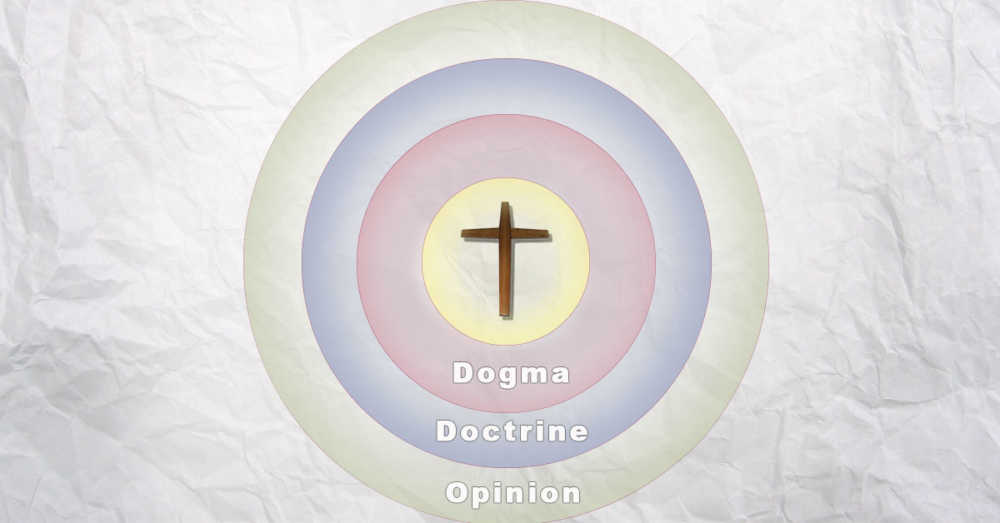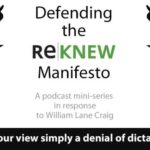We run our website the way we wished the whole internet worked: we provide high quality original content with no ads. We are funded solely by your direct support. Please consider supporting this project.

Thinking Theologically
In a previous post, I challenged the common notion that the Scripture is the foundation or the center of our faith. Instead, it’s my conviction that the only place to begin is Jesus Christ. Paul says that Jesus Christ is the foundation” (1 Cor 3:11). And Peter proclaimed that Jesus is the “cornerstone” that “the builders rejected (1 Pet 2:6-7), which means that the entire edifice of the Christian faith is to be built upon him. The Bible is not that center, but it actually points to the center of our faith, Jesus. This was the confession of the early Church Fathers. “[T]he standing message of the Fathers to the Church Universal,” writes Georges Florovsky, was that “Christ Jesus is the Alpha and Omega of the Scriptures both the climax and the knot of the Bible.”
We must adopt Paul’s humble mindset and start with the confession that we “know nothing … except Jesus Christ and him crucified” (1 Cor 2:2). From beginning to end our thinking about God, our theological beliefs and even our interpretation of Scripture should be centered on the crucified Christ. As Karl Barth brilliantly emphasized throughout his Church Dogmatics, and as Thomas Torrance has more recently clearly elucidated in a number of writings, Jesus is not one of God’s words; Jesus, as the God-become-human, is the Word to which all the words of Scripture bear witness. As such, we should regard him to be the essential content and ultimate purpose of all “God-breathed” words.
With the center of Christ, all other beliefs can be assessed according to their relative importance to that starting point of Christ. Instead of weighing all beliefs on a level plain, I envision three concentric circles surrounding that center. The proximity of each circle to the center reflects its relative importance.

In the first circle out from Christ is what I call Dogma. In this ring are those beliefs that have traditionally been understood to constitute orthodox Christianity, which are reflected in the foundational ecumenical creeds. The belief that God is a Trinity, that Christ is fully God and fully human, and that the world is created and governed by God are examples that we find here.
The second circle is called Doctrine. These are beliefs that orthodox Christians have always espoused, but over which there has been some disagreement. These are different doctrines that distinguish various denominations. For instance, while orthodox Christians have always believed that God governs the world, there are a variety of ways of stating how God does this. You might check out my book co-authored with Paul Eddy called Across the Spectrum to see some of the ways that people hold different Doctrines.
I call the third ring Opinion. Here I place beliefs that individual Christians have occasionally espoused but have not gained widespread support. One might, in other words, claim that my proposal in Crucifixion of the Warrior God falls in this category and is offered to invite further conversation about it. While the ring called Doctrine is comprised of different ways Christians have interpreted Dogma, this third ring usually comprises different ways of interpreting particular Doctrines.
There is plenty of room for different ways of applying this way of thinking theologically. While the church might uniformly agree on that which constitutes Dogma, some will see certain beliefs that should be labeled as Doctrine, while others will argue that they are Opinion. But the most important aspect of this model is that it articulates the fact that not all beliefs are equally important while making it clear that everything revolves around the starting point of our theology: the crucified Christ. This is the center of our theology and all of our theological reflection.
—Adapted from Benefit of the Doubt, pages 170-173
Category: General
Tags: Cruciform Theology, Friendly Disagreements, Heresy
Related Reading

Did God Destroy Sodom and Gomorrah? (podcast)
Greg considers the destruction of Sodom and Gomorrah and speculates on the nature of the angels who were sent there. Episode 597 http://traffic.libsyn.com/askgregboyd/Episode_0597.mp3

Who is Responsible for Job’s Suffering?
In the prologue of the Book of Job, the author seems to ascribe the responsibility for Job’s affliction to Yahweh. For instance, Satan challenges God to “stretch out [his] hand and strike everything he has,“ believing that this would incite Job to curse God to his face (1:11). The fact that the Lord responds by…

The Reformers and the Centrality of Christ
The Christocentric nature of the Church’s hermeneutic approached a zenith in the Protestant Reformation. While Luther and Calvin rejected allegorical interpretation, in theory if not in practice, they nevertheless relied on typology and other creative hermeneutical strategies to discern how Christ was the subject matter of the OT. For Luther, Jesus was “the Word” in…

Podcast: Defending the Manifesto (5 of 10)
Greg responds to challenges by William Lane Craig from Craig’s podcast “Reasonable Faith.“ Craig argues that Greg’s model of reading the bible through the lens of Jesus Christ is simply Greg’s way of rejecting the dictation theory of inspiration—which everyone does. Greg denies this and claims that his view of inspiration is more than simply…

When God Endorsed Polygamy
We often find God acting as if he supports things we know, by other means, that he does not. For example, though his ideal was monogamy, it’s clear in the biblical narrative that, once God decided to permit men to acquire multiple wives and concubines, he was not above bearing the sin of his people…

Classical Theism’s Unnecessary Paradoxes
The traditional view of God that is embraced by most—what is called “classical theology”—works from the assumption that God’s essential divine nature is atemporal, immutable, and impassible. The Church Fathers fought to articulate and defend the absolute distinction between the Creator and creation and they did this—in a variety of ways—by defining God’s eternal nature…
